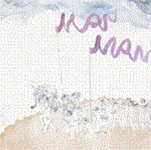|
|
 |
Dusted Reviews
Artist: Man Man Album: Six Demon Bag Label: Ace Fu Review date: Mar. 12, 2006 |

|
|
|
 |
Philadelphia’s independent music scene can safely be cut into three subsets: the fairly infectious, vaguely retro indie-pop of B.C. Camplight, the Capitol Years, the Spinto Band, the A-Sides, and the Teeth; the stoned psych-folk wonder of Bardo Pond, Fursaxa, Brother JT, and Espers; and the spazzed-out mutli-genre miasma of Need New Body, Coyote, Golden Ball, and the topic of today’s discussion, Man Man. They all have distinct ideas about their music, so despite playing on the same bills and having the same fans, these groups’ sounds’ rarely overlap. Inside each of these subdivisions, however, the groups intersect, fracture, and recombine with a certain regularity, resulting in a constantly evolving mix of bands and sounds; Fursaxa and Bardo Pond have joined forces more times than anyone can really remember, Espers and Golden Ball were housemates/neighbours once upon a time, and B.C. Camplight involves contributions from many of the Philly indie-poppers. So it came as no surprise that when Man Man was in the market for a new drummer about a year ago, they picked up Chris Powell of Need New Body. This change, however, did very little to alter the course of the good ship Man Man on Six Demon Bag, their second album.
Unlike Need New Body, which is so willfully flighty that it’s nearly impossible to track a single thread through any of their recordings, Man Man manages to combine a seemingly endless array of influences into an (at least mostly) coherent thought. This blending was a bit more obvious in their debut, The Man in a Blue Turban with a Face, in which all their myriad influences - everything from Beefheart to Zappa to Moondog to Tom Waits to klezmer to cabaret and beyond - were seamlessly homogenized into a uniquely different sound. Here, they seem to focus more closely on Rain Dogs-era Tom Waits, particularly on “Banana Ghost,” “Engwish Bwudd,” and “Black Mission Goggles,” which borrow everything from Waits’ shuffling beats to his guitar sound while singer Honus Honus makes his voice as scratchy, scraggly, and generally as Waits-like as possible. And while they refrain from borrowing quite as overtly from Waits over the rest of the album, his spirit is still felt throughout in the broken waltzes, shanties, rockers, and ballads that populate the record.
Their basic formula, though, remains the same as on Blue Turban. Honus Honus morphs his voice in a thousand different directions while playing either a wonderfully not-quite-in-tune upright piano (doing its best player piano impression) or his signature electric organ. Percussion rattles, clatters, clanks, and chugs, bringing in flower pots, frying pans, woods blocks, whips, and more to supplement the ever-so-slightly off drum kit in a way that would make Paul Lansky proud. And xylophones and glockenspiels play a major supporting role in most of the songs. But beyond that, Man Man throws in a different kitchen sink than in Blue Turban, placing the guitars much more at the fore, adding more muted trumpet and even including some prog style fluting, while cutting down on the strings and accordion. The songs tend to be much more focused than on Blue Turban (with “Ice Dogs” morphing from King Crimson to doo wop and “Push the Eagle’s Stomachs” evolving from Oneida to, well, a different side of Oneida being the exceptions that prove the rule), almost all finishing under five minutes, most with only one or two things to say. Many of these songs had been gestating for at least a year before being recorded, so all the idiosyncrasies are carefully placed for maximum effect.
None of this description really does justice to the three-ring cabaret circus clowning that is really at the core of everything Man Man does. Each moment of each song is completely unpredictable, to the point where even after multiple listens some of these transitions still seem to come out of nowhere. To call it art-rock excess, though, is to miss the point. Man Man isn’t merely a concept (unlike, say, Need New Body or other likeminded weirdos), and once one gets past the convolution and surrealism and the occasional sense of whiplash, a strange yet appealing vision of the world emerges: the ultimate playground for the caffeine-laden mind.
By Dan Ruccia
|







